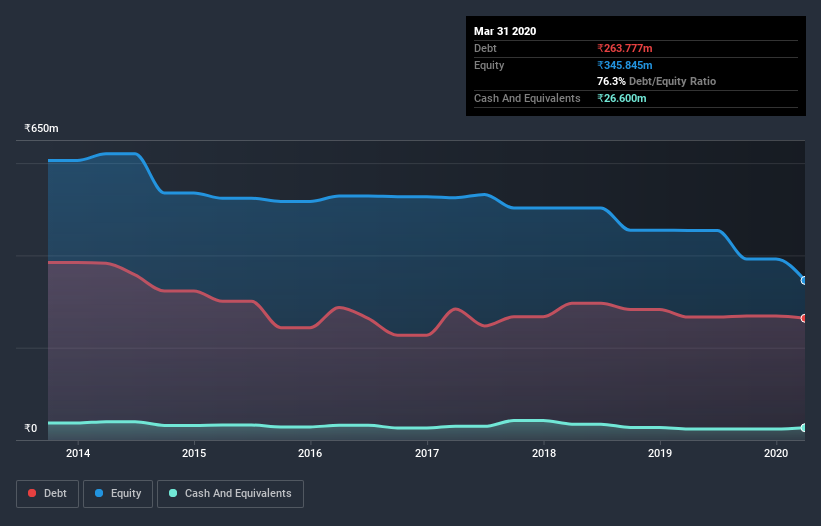Does Pearl Polymers (NSE:PEARLPOLY) Have A Healthy Balance Sheet?
The external fund manager backed by Berkshire Hathaway's Charlie Munger, Li Lu, makes no bones about it when he says 'The biggest investment risk is not the volatility of prices, but whether you will suffer a permanent loss of capital.' So it seems the smart money knows that debt - which is usually involved in bankruptcies - is a very important factor, when you assess how risky a company is. We can see that Pearl Polymers Limited (NSE:PEARLPOLY) does use debt in its business. But the more important question is: how much risk is that debt creating?
When Is Debt Dangerous?
Generally speaking, debt only becomes a real problem when a company can't easily pay it off, either by raising capital or with its own cash flow. Part and parcel of capitalism is the process of 'creative destruction' where failed businesses are mercilessly liquidated by their bankers. However, a more common (but still painful) scenario is that it has to raise new equity capital at a low price, thus permanently diluting shareholders. Having said that, the most common situation is where a company manages its debt reasonably well - and to its own advantage. The first step when considering a company's debt levels is to consider its cash and debt together.
Check out our latest analysis for Pearl Polymers
What Is Pearl Polymers's Net Debt?
As you can see below, Pearl Polymers had ₹263.8m of debt, at March 2020, which is about the same as the year before. You can click the chart for greater detail. However, because it has a cash reserve of ₹26.6m, its net debt is less, at about ₹237.2m.

How Strong Is Pearl Polymers's Balance Sheet?
Zooming in on the latest balance sheet data, we can see that Pearl Polymers had liabilities of ₹616.9m due within 12 months and liabilities of ₹92.6m due beyond that. On the other hand, it had cash of ₹26.6m and ₹308.5m worth of receivables due within a year. So its liabilities outweigh the sum of its cash and (near-term) receivables by ₹374.5m.
Given this deficit is actually higher than the company's market capitalization of ₹336.7m, we think shareholders really should watch Pearl Polymers's debt levels, like a parent watching their child ride a bike for the first time. In the scenario where the company had to clean up its balance sheet quickly, it seems likely shareholders would suffer extensive dilution. The balance sheet is clearly the area to focus on when you are analysing debt. But you can't view debt in total isolation; since Pearl Polymers will need earnings to service that debt. So if you're keen to discover more about its earnings, it might be worth checking out this graph of its long term earnings trend.
In the last year Pearl Polymers had a loss before interest and tax, and actually shrunk its revenue by 20%, to ₹1.4b. To be frank that doesn't bode well.
Caveat Emptor
Not only did Pearl Polymers's revenue slip over the last twelve months, but it also produced negative earnings before interest and tax (EBIT). Indeed, it lost a very considerable ₹82.9m at the EBIT level. Considering that alongside the liabilities mentioned above make us nervous about the company. It would need to improve its operations quickly for us to be interested in it. For example, we would not want to see a repeat of last year's loss of ₹111.5m. In the meantime, we consider the stock to be risky. The balance sheet is clearly the area to focus on when you are analysing debt. However, not all investment risk resides within the balance sheet - far from it. Like risks, for instance. Every company has them, and we've spotted 3 warning signs for Pearl Polymers (of which 2 are concerning!) you should know about.
Of course, if you're the type of investor who prefers buying stocks without the burden of debt, then don't hesitate to discover our exclusive list of net cash growth stocks, today.
When trading Pearl Polymers or any other investment, use the platform considered by many to be the Professional's Gateway to the Worlds Market, Interactive Brokers. You get the lowest-cost* trading on stocks, options, futures, forex, bonds and funds worldwide from a single integrated account. Promoted
New: Manage All Your Stock Portfolios in One Place
We've created the ultimate portfolio companion for stock investors, and it's free.
• Connect an unlimited number of Portfolios and see your total in one currency
• Be alerted to new Warning Signs or Risks via email or mobile
• Track the Fair Value of your stocks
This article by Simply Wall St is general in nature. It does not constitute a recommendation to buy or sell any stock, and does not take account of your objectives, or your financial situation. We aim to bring you long-term focused analysis driven by fundamental data. Note that our analysis may not factor in the latest price-sensitive company announcements or qualitative material. Simply Wall St has no position in any stocks mentioned.
*Interactive Brokers Rated Lowest Cost Broker by StockBrokers.com Annual Online Review 2020
Have feedback on this article? Concerned about the content? Get in touch with us directly. Alternatively, email editorial-team@simplywallst.com.
About NSEI:PEARLPOLY
Pearl Polymers
Engages in manufacture and trading of PET bottles, jars, and containers to consumers and industries in India.
Flawless balance sheet with low risk.
Similar Companies
Market Insights
Community Narratives



